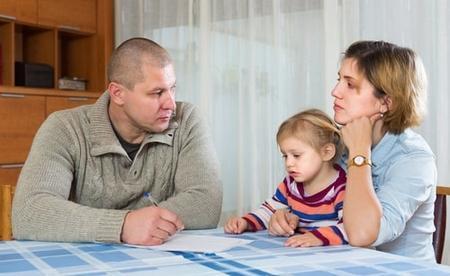4 Tips for Telling Your Family You Are Getting a Divorce
 Whether you have seen your divorce coming for some time or the realization of your unraveling marriage has taken you by surprise, telling your children, extended family, and acquaintances that your marriage is over is never a pleasant experience. It is not uncommon for friends and family to feel a sense of loss themselves, as they too grew familiar and comfortable seeing you and your spouse together, often over a period of many months or years. Children in the family can take divorce especially hard, making the duty of breaking the news to the kids infinitely more difficult for parents.
Whether you have seen your divorce coming for some time or the realization of your unraveling marriage has taken you by surprise, telling your children, extended family, and acquaintances that your marriage is over is never a pleasant experience. It is not uncommon for friends and family to feel a sense of loss themselves, as they too grew familiar and comfortable seeing you and your spouse together, often over a period of many months or years. Children in the family can take divorce especially hard, making the duty of breaking the news to the kids infinitely more difficult for parents.
Communication is Key
Some divorcing couples make a mutual agreement to tell the children together, while others make arrangements to delegate the “talk” to one parent. Some couples never even have the chance to discuss who will speak to the children about the split because of the conflict and tension surrounding the end of the relationship. Whatever your personal circumstances, consider the following as you tell your kids, friends, and family that you and your spouse are going your separate ways:
-
Get your own emotions in check. Psychology experts emphasize the need for self-care during a divorce, especially when it comes to mental health. Although it is much easier said than done, getting your own emotions in check before you break the news of your separation to your loved ones can help a great deal. Approaching the conversation with a clear head and a calm demeanor can soften the blow, allowing your children and family members to absorb the news. The more in control you appear to be, the better they will receive the news.
-
Rehearse what you are going to say. The American Psychological Association (APA) says communication plays a big role in the overall divorce process. If you want the transition to be as healthy and smooth as possible, plan ahead by preparing your words before you share the news with everyone. This is especially crucial if you are telling your children that Mom and Dad are getting divorced. If you and your spouse are speaking civilly and cooperating with one another, consider sitting down together and outlining who will say what and how you will say what you need to say.
-
Keep conflict away from the little ones. Research shows that exposure to parental conflict increases a child’s chances of experiencing psychological and social problems. When it is time to tell your kids about the divorce, be sure to leave out expressions of hostility towards the other parent, argumentativeness, and any form of conflict that may cause further distress in the midst of an already upsetting situation. If you and your spouse cannot work together to break the news to your child, consider working alongside a therapist for guidance.
-
Draw upon your resources for help. If your spouse is willing to sit down with you and create a game plan for telling your family about the divorce, take them up on the offer. Cooperation, along with communication, is key to a successful divorce transition, and the transition begins with news of the split. Do your best to do your part in working together, but if there is no way to do so, consider asking for help from other sources. Speak with a therapist, or if crunched for time, talk to a trusted friend or family member. For example, maybe a certain sibling, grandparent, or uncle is particularly close to your child. Consider asking them to be there with you when you tell your kid the news, or ask for their insight on how to break the news to an especially difficult family member.
Contact a St. Charles Divorce Attorney
The divorce experience is taxing on everyone involved. With the right resources, however, you can reduce the impact of the emotional toll you will inevitably experience. Speak with a qualified Kane County family law attorney to address the legal aspects of the divorce so you can focus on what is really important: your well-being and that of your loved ones. Call Goostree Law Group at 630-584-4800 to schedule a free consultation today.
Sources:
http://www.apa.org/helpcenter/healthy-divorce.aspx
https://www.psychologytoday.com/us/blog/better-divorce/202002/how-tell-your-kids-you-re-getting-separation-or-divorce











